 Petzlover
Petzlover Both Fox Terrier (Smooth) and Otterhound are originated from United Kingdom. Fox Terrier (Smooth) may grow 29 cm / 11 inches shorter than Otterhound. Fox Terrier (Smooth) may weigh 45 kg / 99 pounds lesser than Otterhound. Both Fox Terrier (Smooth) and Otterhound has almost same life span. Both Fox Terrier (Smooth) and Otterhound has almost same litter size. Both Fox Terrier (Smooth) and Otterhound requires Moderate Maintenance.
Both Fox Terrier (Smooth) and Otterhound are originated from United Kingdom. Fox Terrier (Smooth) may grow 29 cm / 11 inches shorter than Otterhound. Fox Terrier (Smooth) may weigh 45 kg / 99 pounds lesser than Otterhound. Both Fox Terrier (Smooth) and Otterhound has almost same life span. Both Fox Terrier (Smooth) and Otterhound has almost same litter size. Both Fox Terrier (Smooth) and Otterhound requires Moderate Maintenance.
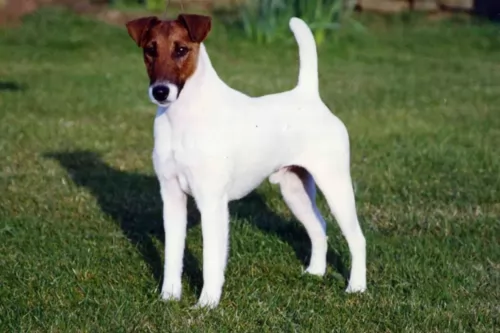 The Smooth Fox Terrier is one of two Fox Terrier breeds, the other being the Wirehaired Fox Terrier. Fox Terriers are believed to be one of the oldest terrier breeds and the ancestor of many terriers who came after. The Fox Terrier was recognized by the American Kennel Club in 1885 and the smooth Fox Terrier as a separate breed 100 years later in 1985. Some clubs still consider the two types of Fox Terriers as the same breed. The standard for smooth Fox Terrier was written in 1876 but not accepted until 1985.
The Smooth Fox Terrier is one of two Fox Terrier breeds, the other being the Wirehaired Fox Terrier. Fox Terriers are believed to be one of the oldest terrier breeds and the ancestor of many terriers who came after. The Fox Terrier was recognized by the American Kennel Club in 1885 and the smooth Fox Terrier as a separate breed 100 years later in 1985. Some clubs still consider the two types of Fox Terriers as the same breed. The standard for smooth Fox Terrier was written in 1876 but not accepted until 1985.
Both breeds of Fox Terriers are thought to originate in the late 1800’s descended from various British Terriers, the beagle, the dachshund and the Fox Hound. The Smooth Fox Terrier has a base coat that is white. The hunters bred them this way, so they would not mistake them for the fox during the hunt. They have also been very successful in prestigious dog shows including Crufts in England and New York Westminster in the United States.
They are not that popular today unless you are hunting and showing them in Confirmation Competitions. However, the Smooth Fox Terrier is significant because of all the terriers that consider it their direct ancestor. This would include the Jack Russel, the Rat Terrier and the Miniature Fox Terrier.
 There aren’t many Otterhounds around and this British pure-breed dog is a scenthound and dates far back to the 19th century.
There aren’t many Otterhounds around and this British pure-breed dog is a scenthound and dates far back to the 19th century.
The dog is regarded as a Vulnerable breed by the English Kennel Club. It is believed that these dogs descended from Bloodhounds and that it was developed in England to hunt otters.The dog’s nose is so sensitive that he was well suited to this job. He was appreciated by royalty and had many royal admirers.
The dog was brought to the United States in 1900 and the Otterhound Club of America was founded in 1960 with the Otter Hound being officially recognized by the American Kennel Club in 1991.
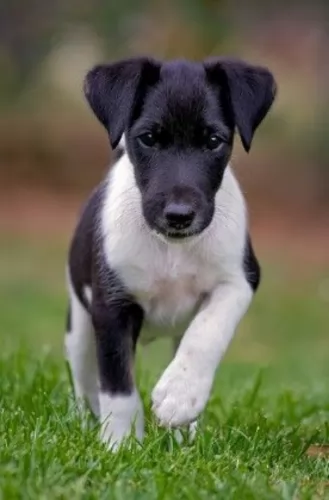 The Smooth Fox Terrier is distinguished from the Wirehaired and other terriers by his V-shaped head and white based coat. The coat can have tan, black and black and tan marks on the white coat. The Smooth Fox Terrier is sturdy, strong, sleek and symmetrical. The breed has a short back, and proportioned legs. The Smooth Fox Terrier has a flat skull and tapered muzzle. The nose is black, and the eyes are dark. He has v-shaped ears and a docked tail. Docking is no longer legal throughout the United Kingdom.
The Smooth Fox Terrier is distinguished from the Wirehaired and other terriers by his V-shaped head and white based coat. The coat can have tan, black and black and tan marks on the white coat. The Smooth Fox Terrier is sturdy, strong, sleek and symmetrical. The breed has a short back, and proportioned legs. The Smooth Fox Terrier has a flat skull and tapered muzzle. The nose is black, and the eyes are dark. He has v-shaped ears and a docked tail. Docking is no longer legal throughout the United Kingdom.
 The Otterhound has a weather-resistant double coat which is somewhat oily. The coat is available in a number of colors such as wheat, red, grizzle, black, cream and tan with some white markings.
The Otterhound has a weather-resistant double coat which is somewhat oily. The coat is available in a number of colors such as wheat, red, grizzle, black, cream and tan with some white markings.
The double coat is somewhat oily and he has webbed feet, making him particularly suited for his life around water. This large hound stands at between 61 and 70cm and weighs in the region of 35 to 54kg. He has a large head with a nose that can track and scent in mud.
Otterhounds are active dogs, loving nothing more than to be running and playing, and that of course includes swimming. He makes a great sporting companion too and won’t have trouble keeping up with you as you jog or cycle.
These dogs are friendly, social, docile and amicable but they are also strong-willed, stubborn and independent. If you want him to be obedient and well behaved, then he will most certainly require training and socialization.
They get on well with children and will appreciate a firm, consistent, kind owner. He isn’t a city dog as he requires room to run, and therefore a farm or home with large grounds will suit him. Not only that, he is quite a barker, especially when he is bored with nothing to do so city life and living close to neighbors won't do for him . He will suit an active, outdoor family.
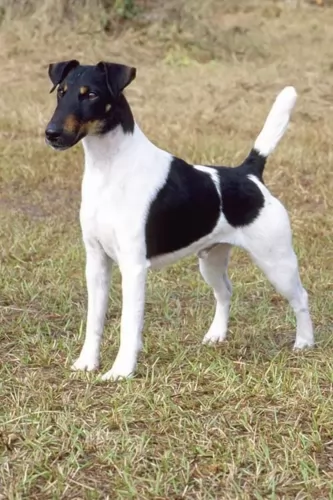 Children friendliness They shouldn’t be trusted with young children but if raised with older children ok
Children friendliness They shouldn’t be trusted with young children but if raised with older children ok
They are good at performing tricks, Search and rescue, narcotics detection, tracking, and disability assistance.
Fox Terrier is adaptable and can live anywhere. He is not a big dog but remember he is very high energy.
They have very good learning ability and are very intelligent but can be stubborn
 Your Otterhound is a big, beautiful dog who is also lovable, making a great pet for an active kind of family. He is friendly, social and playful but he is also independent and likes to have his own space occasionally.
Your Otterhound is a big, beautiful dog who is also lovable, making a great pet for an active kind of family. He is friendly, social and playful but he is also independent and likes to have his own space occasionally.
He is a loyal, fun dog who has a sense of humor, providing quite a bit of entertainment for his owner. He is the kind of dog that is willing to be 100% part of the family and will be thrilled to be counted in on all activities – whether camping, hiking or swimming.
Give him the love he craves and he will make you an awesome 4-legged friend.
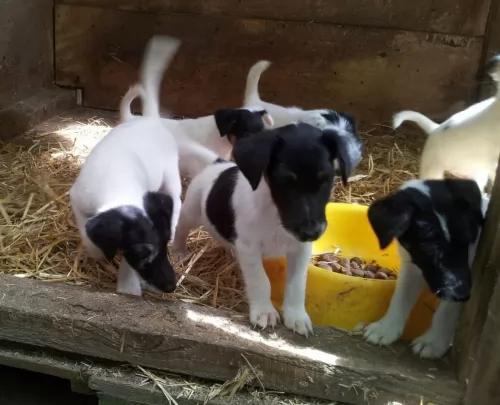 One of the major problems for the Smooth Fox Terrier that the Wirehaired does not face is the potential for deafness. This is an issue in dogs that are mostly white in color. Other concerns that he does share with the Wirehaired Terrier are:
One of the major problems for the Smooth Fox Terrier that the Wirehaired does not face is the potential for deafness. This is an issue in dogs that are mostly white in color. Other concerns that he does share with the Wirehaired Terrier are:
Causes muscle weakness and problems swallowing.
 The average lifespan of this dog is between 10 and 13 years, but with good care he can reach 15 years of age.
The average lifespan of this dog is between 10 and 13 years, but with good care he can reach 15 years of age.
The Otterhound is generally a healthy breed but he can sometimes get one or two of the common dog diseases there are.
Common problems that can occur are hip dysplasia. There are things that can be done to prevent this joint condition and one is to ensure your dog doesn’t become overweight. You also want to prevent having your young dog exercise excessively before his first birthday and you don’t want him leaping off beds or other high places.
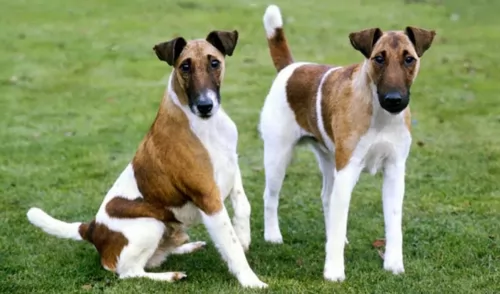 Feed 2-3 meals per day and divide 1/8-1/4 cup
Feed 2-3 meals per day and divide 1/8-1/4 cup
Feed two meals per day and divide ½ cup
hearing and vision
The Smooth Fox Terrier is an athlete requiring a lot of exercise. Take him on long walks and play with him in a large fenced yard. Don’t coup him up in the house. Be careful not to exercise him off leash as he will chase anything that moves and will not come when called. They need mental stimulation as well as physical. They are good at hunting, agility, tracking, performing tricks and being a watchdog.
 Your Otterhound has a curly, longish water resistant double coat which doesn’t shed much. The coat is easy to groom, requiring nothing much more than a brush twice a week.
Your Otterhound has a curly, longish water resistant double coat which doesn’t shed much. The coat is easy to groom, requiring nothing much more than a brush twice a week.
The nails of the dog should be checked regularly and trimmed. Check in and outside his ears as well as his eyes for any sign of infection.
His teeth should also be checked. Some people are reluctant to brush their pet’s teeth, saying this is a new money-making fad and that it has never been required in the past. Whatever your views, periodically check inside your pet’s mouth for the sign of a rotten tooth as this can cause your pet a lot of pain and illness.
The Otterhound has no special food requirements and relies on you to feed him quality, tasty food. For convenience, there are some excellent ready-to-eat, convenient commercially manufactured foods made to cater for your pet’s size and his activity levels.
He also relies on variety in his diet, so give him some home-made food added into the kibble a couple of times a week. Boiled chicken, brown rice or pasta and some cooked vegetables such as carrots, sweet pototoes and spinach will be excellent for him.
He will thank you for keeping things so simple for him as then he won’t be plagued by digestive problems and visits to the vet. You can also add in some raw meat occasionally. Never leave him without fresh, cool water.